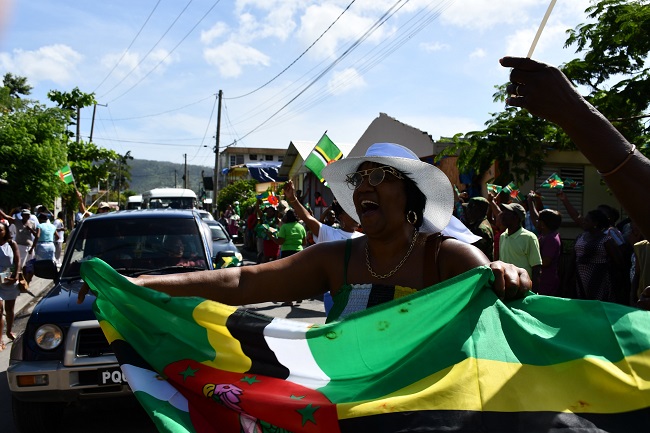Dominica nicknamed the “Nature Island of the Caribbean” for its natural environment, is an island nation in the Caribbean, officially known as the Commonwealth of Dominica. On the western part of the island is Roseau, the country’s capital. It is situated in the Caribbean Sea as a member of the Windward Islands chain in the Lesser Antilles archipelago.
Dominica’s nearest neighbors are the two overseas departments of the French Republic that make up the European Union and Eurozone, Guadeloupe to the northwest and Martinique to the south-southeast. Dominica covers a land area of 750 km2 (290 sq mi), and the highest point is Morne Diablotins, at 1,447 m (4,747 ft) in elevation.
The country was officially granted independence as a republic by the United Kingdom on November 3, a move that was championed by Prime Minister Patrick John.
The climate of Dominica is tropical, hot and humid all year round, with a relatively cool and dry season from January to mid-April and a hot, humid and rainy season from mid-June to mid-November.
POPULATION
According to worldometers, the current population of the country is pegged at 72,376 as of Friday, September 9, 2022, based on the latest United Nations estimates. Dominica’s population is equivalent to 0.00092% of the total world population. The country ranks at number 204 in the list of countries (and dependencies) by population.
NATURAL RESOURCES
According to Globalecomomy.com, the natural resources of Dominica are oil, natural gas, coal, minerals, and the forest.
ETHNICITY
The most populous ethnic in Dominica is African, with 86.6%, followed by 9.1% of Multiracial, 2.9% Kalinago, 1.3% of European or Other, and 0.2% Unspecified.
Dominica’s official language is English, which is widely used and understood. Also, a commonly used language is Dominican Creole, an Antillean Creole based on French.
RELIGION
The most common religion in Dominica is Christianity, with a majority of practitioners identifying themselves with Roman Catholicism. Minority practised religions such as Rastafarians, Islam, and others also exist in the country.
POPULATION
As of 2015, Dominica’s literacy rate is 91.8% of the total population. While the literacy rate for men is 91.2%, it is 92.3% for women, demonstrating a very slight discrepancy between the sexes.
FOOD
The cuisine of Trinidad and St. Lucia, as well as many other Caribbean islands, is comparable to Dominica’s. Despite being separated by an ocean, the cuisines of Dominica and other Commonwealth Caribbean islands are distinctive.
Some of the foods to enjoy in the country are Mountain Chicken, Manicou, Agouti, Callaloo Soup, Chatou Water, Sancocho, Sorrel Punch, Codfish Sandwich, Local Rum and Fresh Fruits.
VISA POLICY
Dominica is visa-free for Nigerian citizens for up to six months.
According to Dominica Visa policy, All Commonwealth nations, of which Nigeria is part, can gain access and stay in the country for up to six months without the need for a visa.
Persons from the following countries wishing to enter into the Commonwealth of Dominica for a period not exceeding six months:
Also, citizens from CARICOM member states, Austria, Bulgaria, Cyprus, Czech Republic, Estonia, Finland, Hungary, Latvia, Lithuania, Poland, Romania, Slovakia, Slovenia, and the United States of America can also stay up to six months in the country without a visa.
The country is also visa-free for 3 months to citizens of the following countries wishing to enter the Commonwealth of Dominica. They are Argentina, Belgium, Costa Rica, Denmark, France, Germany, Greece, Ireland, Israel, Italy, Japan, Malta, Mexico, Netherlands (including Netherland Antilles), Norway, People’s Republic of China, Portugal, South Korea, Spain, Suriname, Sweden, United Kingdom and Venezuela.
Also, any in-transit passenger or bona fide tourist who has a return ticket and satisfies the Immigration Officer that he/she does not intend to remain in the State for a period exceeding twenty-one days can gain access into the country without a visa.
The only two countries that require a visa before entering the Dominica Commonwealth are the Dominican Republic and Haiti. To enter for tourist purposes, you must apply for a visa if you are from Haiti or the Dominican Republic. The procedure is straightforward, however, to complete it you must schedule a visit at the closest Dominica embassy or consulate.
The requirements are the following:
- Fill out the visa application form with personal and trip details.
- Valid passport.
- Two passport photos.
- Letter of Invitation
- Bank statements showing your funds for the trip. These details can be yours or from your sponsor.
- An employment contract or proof of self-employment.
- Application fee of USD 82.
Dominica doesn’t require any visa application in advance. You will need to present only some basic documents to enter Dominica.
The required documents for traveling to Dominica are:
- Passport
- Hotel Booking
- Confirmed Onward/Return Tickets
- Entry Documents to Your Next Destination (if any)
- Sufficient Funds for Intended Period to Stay in Dominica
HOW TO EXTEND YOUR STAY IN DOMINICA
If you wish to extend your stay for more than six months as a Nigerian in Dominica, you will need to apply for an extension of your stay. Below are some of the requirements you need.
Requirements for Visa Extension
- Interview with the Inspector-in-Charge of Immigration in person
- Valid passport.
- Valid return ticket
- Funds for the stay extension.
- A local address
Additionally, if you lose your passport while visiting Dominica, you can apply for a Certificate of Identity, which serves as a temporary travel document. You must do the following actions in this situation:
- Purchase the stamp for USD 20.
- Passport photo.
- Some IDs, such as a driver’s license, birth certificate, or immigration records.
According to trip.com, the lowest price of a flight from Lagos, Nigeria to Dominica is US$1,152.
Top Attraction Centre
Dominica, also referred to as “The Nature Island of the Caribbean,” is still a pristine haven for hikers, divers, and naturalists. It is the largest of the Windward Islands and has some of the tallest mountains in the Eastern Caribbean as well as magnificent volcanic landscapes with lush jungles, waterfalls, lakes, gorges, rivers, and steaming hot springs.
Let’s take a look at some of them according to a list by planet ware.
1. Morne Trois Pitons National Park
Dominica’s crowning achievement is the Morne Trois Pitons National Park. The park, which spans a large portion of the island’s mountainous core, is a remnant of the island’s prehistoric rainforest, ranging from dense jungle to stunted cloud forest on the highest slopes of the 1,424-meter Morne Trois Pitons.
Lake and mist-covered Boeri Lake are two of the 17,000-acre UNESCO World Heritage Sites highlights. This lush park is also home to many of Dominica’s most picturesque waterfalls, including Victoria Waterfall, Trafalgar Falls, Emerald Pool, and Middleham Falls.
2. Boiling Lake
One of the most visited sites in Morne Trois Pitons National Park is Boiling Lake. It takes three hours to reach this eerie-looking lake of boiling, grey-green water through dense woodland. It’s worthwhile, though.
The second-largest active boiling lake in the world, measuring 63 metres across, is thought by geologists to be a flooded fumarole, a fracture in the earth that allows hot gases to escape from the molten lava below. The lake is at boiling point in the middle and has a temperature range of 82 to 92 degrees Celsius near its edge.
3. Victoria Falls
The White River cascades over a cliff into a warm pool below to create Victoria Falls, one of the island’s most stunning and picturesque waterfalls, in Morne Trois Pitons National Park. The water has a milky-white hue because of minerals.
The approximately 40-minute hike entails rock scrambling and river crossings; yet, it is worth witnessing these lovely falls as well as the river itself. Afterwards, take a plunge in the warm pool to unwind.
4. Trafalgar Falls
One of the most popular activities on Dominica is the climb to Trafalgar Falls. An easy 10- to 15-minute stroll through a forest of ginger and vanilla orchids leads to the twin falls known as Mother and Father.
Near the bottom, a hot mineral spring joins Trafalgar Falls’ cold mainstream, which rises in the mountains. At the base of the falls, there are hot and cold pools surrounded by sulfur-dyed rocks.
5. Cabrits National Park
Black sand beaches, a lush rainforest, swampland, and vibrant coral reefs are all preserved in Dominica’s northwest by Cabrits National Park. From this picturesque peninsula’s highest point, you can see for miles. The reefs also make for great snorkelling and diving.
The park is also the location of one of Dominica’s most fascinating historical sites. The ruins of Fort Shirley, a British fort built in the eighteenth century with stunning views of Prince Rupert Bay, are located here. The colonial history of Dominica is explained in a small museum at the entrance.
6. Roseau
Roseau, the capital of Dominica, is a vibrant jumble of West Indian cottages and bustling market stalls with a cool vibe. It is framed by lush peaks. You won’t find any fancy shops or chain stores here, unlike other Caribbean capitals, simply locally owned businesses and a welcoming, neighbourhood atmosphere.
7. Papillote Tropical Gardens
The charming Papillote Tropical Gardens are a sanctuary for photographers, artists, and botanists. These 10-acre gardens, which are irrigated by a tiny stream, are located on the grounds of the Papillote Wilderness Retreat, a lovely eco-lodge.
Amidst bamboo trees, ginger blooms, native orchids, bromeliads, and begonias, paths wind. The verdant grounds are home to numerous frogs, birds, and butterflies. You can have a dip in the retreat’s mineral-rich pool, which is fueled by a nearby hot spring, and take in the gorgeous views of the mountains and valleys from various parts of the site.
8. Champagne Reef
Champagne Reef, Dominica’s most well-known diving and snorkelling location is located in a marine sanctuary off of the island’s southwest coast. A few feet from the shore, hundreds of bubbles come to the surface from beneath the rocks due to geothermal activity.
In these warm waters, you can find a variety of fish species, including trumpetfish, batfish, sea horses, barracuda, rays, and squid. From Champagne Beach’s rocky, black-sand area, you can swim to the location. For a more serene experience, it’s better to try to schedule your visit to avoid the cruise ship groups.
9. Kalinago Territory
The majority-remaining Kalinago tribe in the Caribbean is found in Dominica. Visit Kalinago Barana Autê, a model community on the northeast coast, around 20 miles from Roseau, to gain some insight into their intriguing culture.
The town is a collection of old-style wooden structures tucked away among banana and breadfruit trees. You can stroll through the community and observe the Carib Indians as they carve dugout boats, weave mats and baskets, and impart their knowledge of healing plants.
10. Dominica’s Beaches
While Dominica attracts tourists mostly for its trekking and natural beauty, the lush Caribbean island also has some lovely stretches of coastline. The majority of Dominica’s beaches are made of volcanic black sand, yet depending on the light, the sand may appear grey
Some of the best beaches in Dominica are Mero Beach, Purple Turtle Beach, Batibou Beach, and so forth.
COST OF LIVING
According to livingcost, the cost of living in Dominica is $992, which is 1.06 times more expensive than the world average. Dominica ranked 67th out of 197 countries by the cost of living and the 144th best country to live in.
The average salary after taxes in Dominica is $486, which is enough to cover living expenses for 0.5 months.
ACCOMMODATION
In Dominica, you can choose from a variety of accommodations, ranging from campgrounds to luxury resorts. On average, the rent for a 1 bedroom apartment in the city centre cost $408, while a 3 bedroom apartment in the city centre cost around $1199.
MINIMUM WAGE
According to wageindicator, the national minimum wage is the least amount a worker can be paid. The minimum wage of workers in Dominica was is EC$7.50 per hour
WORKING HOURS
Dominica’s typical workweek is 48 hours long. Eight hours total, including at least one hour of downtime, make up each day.
JOB OPPORTUNITIES FOR FOREIGNERS
Apart from hotels and resorts management jobs, that is the most popular in the country.
Teaching English might also be an option if you are a native English speaker. You can also search for work in Dominica on expats job portals such as overseas jobs, Go abroad, and Linkedin.
WORK PERMIT
The Division of Labor within the Ministry of National Security and Home Affairs issues work permits. To apply, there is a need to submit the following to the Labour Division in Roseau.
The Requirements
Two completed copies of the work permit application
A medical certificate stating the applicant is healthy
A written job offer — usually a letter from you confirming the employee’s role and accepting responsibility for them
Employers and self-employed applicants should bring their certificate proving registration and a bank statement showing their company’s legitimacy
A police record from the applicant’s home city
Three copies of the original job posting in newspapers
A return ticket to the applicant’s home country or proof of funds to cover their return ticket
The receipt proving payment of the application fee
A passport with at least six months of validity left
A photocopy of the passport bio page
Two passport-style photographs
Two testimonials — one from the applicant’s last employer
Marriage certificate, if necessary
Proof of tourist visa extension to cover the wait time
Application fee and photocopy of Treasury receipt as proof of payment
It should be noted that the application process may sometimes take several months, so applicants must prepare for the wait time accordingly.
TRANSPORTATION SYSTEM
Dominica has different transportation options for moving about the country.
- Taxi service
Taxis are provided at the airports, in Roseau, and can be scheduled throughout the island. The letters H, HA, or HB that appear before the registration numbers on the number plates make them simple to recognise. When requesting a cab, travellers should do so at the Douglas Charles Airport’s Taxi Dispatch.
- Car Rentals
On the island, many car rental companies rent out automobiles. However, you must first pay $30 (US$12) for a driver’s licence before you may start driving. To be eligible for a driver’s permit, you must be between the ages of 25 and 65 and have two years’ worth of driving experience. The left side of the road is used by traffic, and most of them are well-maintained.
- Bus service
Dominica has a dependable public transportation network that is mainly made up of private minibus drivers. In accordance with your destination, bus stations can be found at specific locations throughout the city. The usual bus fares, which depend on the route, range from EC$1.50 to EC$10.25. The bus runs reasonably often throughout the day, however, it is not recommended for nighttime travel.
CRIME AND SECURITY
The island’s remote regions are where crime is most common. Foreigners and residents on the island are moderately at risk from nonviolent crime, which can happen anywhere. The usual targets for thieves include handbags, wallets, purses, smartphones, and other electronic gadgets. Anywhere, but particularly in isolated communities and on beaches, these opportunistic crimes can happen. Due to their perceived riches, both locals and foreigners may be the targets of criminals. Late at night, there is a higher likelihood that crimes against locals and visitors will become violent; nevertheless, crimes of opportunity rarely happen.
Overall, there is a low risk of violent crime in Dominica; criminals do not frequently target visitors. Violent crimes like murder, armed robberies, and rapes do happen occasionally, but they are generally rare. In Dominica, criminals rarely use force against a victim who doesn’t resist; nonetheless, don’t resist.
HOW TO ENSURE SAFETY
If you are a foreigner visiting Dominica, try to engage the service of a local guide who is familiar with the country’s ins and outs to take you around. You should equally avoid night walking as it may likely increase your chances of being targeted by minor thieves.
ALSO READ FROM NIGERIAN TRIBUNE






